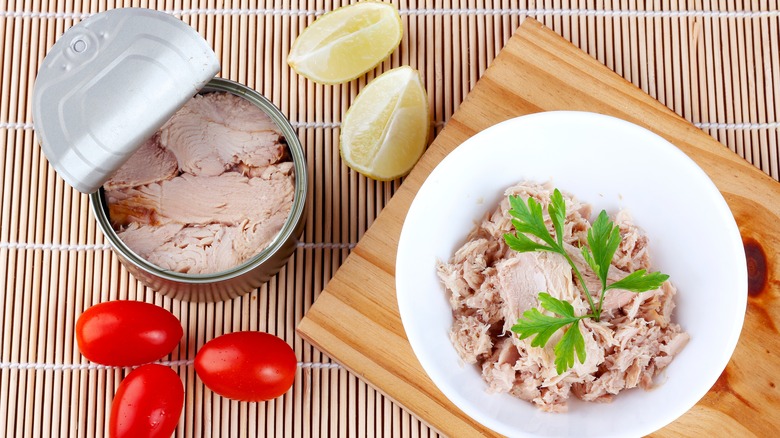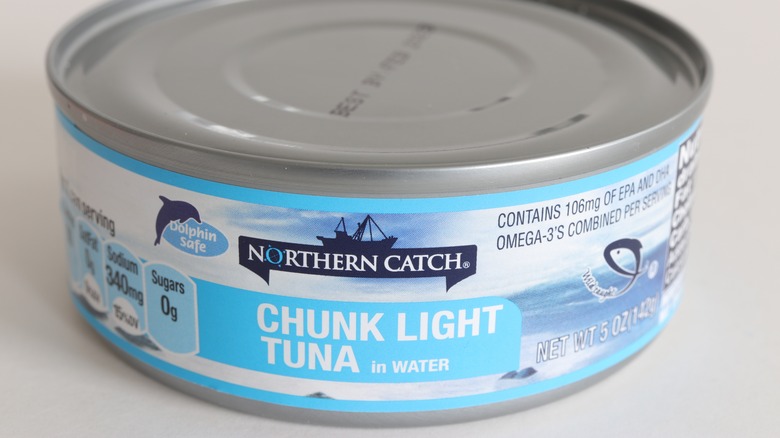Is All Canned Tuna In The US Considered Dolphin-Safe?
We may receive a commission on purchases made from links.
Foodies in the U.S. put away an estimated 1 billion pounds of canned and pouched tuna every single year, according to the National Fisheries Institute. Know who else loves to eat tuna? Dolphins — and it's kind of a problem for them.
Dolphins' diets consist primarily of fish, and the tuna they eat travel in schools numbering in the hundreds or even thousands. Dolphins commonly catch them using cooperative hunting techniques, encircling the school in shallow waters and then agitating the sea floor with their tails. As sediment clouds the water, the fish become easier to catch. It's a smart tactic, but one that has also made dolphins an unwitting casualty at the hands of large-fleet industrial tuna fishermen, who chase, harass, and net the lot. To further complicate matters, in regions of the eastern tropical Pacific Ocean, large yellowfin tuna swim side-by-side with dolphins, making the porpoises even more of a target.
That's why the "dolphin-safe" label was created by the Earth Island's International Marine Mammal Project in 1990. Per the International Marine Mammal Project (IMMP), the dolphin-safe label means "tuna caught without deliberately encircling any dolphins with tuna nets during the entire trip of the tuna vessel." As of 1995, the label also indicates that no dolphins were accidentally killed or seriously injured during the fishing process. Even so, according to the National Oceanic and Atmospheric Administration (NOAA), not all canned tuna sold in the U.S. today is dolphin-safe.
Dolphin safety varies by brand
While some brands are more dolphin-safe than others, federal regulations allow foreign imports of tuna caught by fleets in which dolphins were harmed by accident and under an assigned mortality limit that can vary per vessel (yikes). Much of the dolphin-deadly canned tuna in the U.S. comes from Mexico, Venezuela, and Colombia, which don't have rigorous truth-in-advertising rules. As a result, brands like Dolores and TUNY can legally label their canned tuna as "dolphin-friendly" even if dolphins were harmed. (To be clear, dolphin-deadly brands of canned tuna never contain any actual dolphin meat or byproducts.)
As of 2018, 800-plus canned tuna brands worldwide followed the dolphin-safe standards (it's also called "dolphin-friendly" in Europe), reports the IMMP. The majority of products sold in the U.S. are dolphin-friendly, but to find out whether a particular option is certified dolphin-safe, you can consult the IMMP's list of approved brands on its website. Another terrific resource, Seafood Watch, also offers a comprehensive and regularly updated list of sustainable seafood brands.
Per global environmentalist coalition Greenpeace's tuna shopping guide, Wild Planet, American Tuna, Whole Foods, Ocean Naturals, and Hy-Vee are the top dolphin-safe grocery store brands, while StarKist and the generic canned tunas from Target, Costco, and Walmart rank among the worst for ocean ethics. As a general rule, canned tuna labeled as pole-caught, pole-and-line-caught, troll-caught, FAD-free, free school, or school-caught tends to follow the most ethical, bycatch-casualty-free fishing practices.

